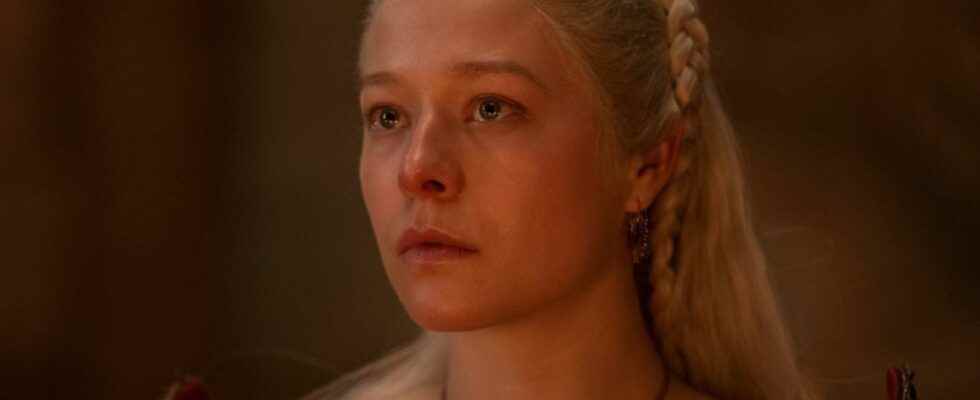“House of the Dragon”
This “Game of Thrones” reference leads to war
Rhaenyra Targaryen faces an uncertain future in House of the Dragon.
© Home Box Office, Inc. All rights reserved
The latest “House of the Dragon” episode takes up a fateful prophecy from the previous series “Game of Thrones”.
The epic fantasy series Game of Thrones, which ended in 2019, and its upcoming prequel House of the Dragon are connected in many ways. Not only is “House of the Dragon” about the ancestors of “GoT” main character Daenerys Targaryen (Emilia Clarke, 35), a large part of the series also plays in Königsmund, the capital of the Seven Kingdoms. As in the parent series, of course, in “House of the Dragon” there is also an intense struggle for the exclusive place on the Iron Throne.
A very special connection between the two successful series, however, is the so-called prophecy about the “prince who was promised”. In “Game of Thrones” Daenerys sees herself as the “princess who was promised”, a messiah figure, the Westeros unite and protect against the threatening danger from the north by the white walkers. In the first “House of the Dragon” episode, however, King Viserys Targaryen (Paddy Considine, 49) tells his daughter Princess Rhaenyra (then: Milly Alcock, 22) about the said prophecy. His ancestor Aegon, the conqueror of Westeros, once dreamed of the White Walkers and Death from the Ice – and this knowledge has been passed on within the ruling family for generations.
Ironically, in the recently released eighth “House of the Dragon” episode, it is precisely this prediction about a united Westeros that leads to the irreconcilable division of the Seven Kingdoms. What happened?
Warning, spoilers for episode eight of “House of the Dragon”
In the latest episode of the HBO series, King Viserys is about to breathe his last. A family dinner with the two warring parties, his wife Lady Alicent Hohenturm (Olivia Cooke, 28), her children and her father Ser Otto (Rhys Ifans, 55) and Princess Rhaenyra (now: Emma D’Arcy, 30), her children and her second husband Prince Daemon Targaryen (Matt Smith, 39) has robbed the seriously ill king of any remaining vitality.
Viserys, suffering from a form of leprosy, languishes in his chambers. His wife Alicent gives him the hallucinating poppy juice to relieve his pain. However, Viserys thinks Alicent is actually Rhaenyra. He considers his firstborn daughter and designated heir to be “The Princess That Was Promised”. The confused Viserys explains to the present Alicent: “You are it. You are the promise. You have to do it.”
At this point, one of the most momentous misunderstandings in the history of Westeros occurs. Because while the dying King Viserys is actually talking about his ancestor Aegon the Conqueror and his prophetic dream and with the words “You are the promise” means his daughter Rhaenyra, the listening Alicent thinks that Viserys is talking about their son Aegon Targaryen (Ty Tennant, 20 ) means. Queen Alicent takes Viserys’ statement as a request to place Aegon on the Iron Throne in place of Rhaenyra in order to save the kingdom.
In addition to the extremely poor health of the dying king, the misunderstanding favors the fact that there are simply too many Aegons in Westeros.
Does Alicent really misunderstand her husband?
Now, at this point in the “House of the Dragon” series, one might assume that Queen Alicent really doesn’t misunderstand her ailing husband at all, but only hears what she wants to hear. But Geeta Patel (46), the director of the eighth “House of the Dragon” episode, contradicts this reading in an interview with the “Hollywood Reporter”.
“The intention was that [Alicent] sincerely thinks that [Viserys] told her that her son will be heir to the throne,” explains director Patel. She wanted to show the “vulnerability and innocence in Alicent” in this key scene. The character has more to do with “the girl we grew up with in episode one”. And indeed, just before in episode eight, Alicent and her one-time childhood friend Rhaenyra seemed closer to rapprochement and reconciliation than they had been in any previous year.
There is a certain irony in the fact that a prophecy intended to unite the empire serves as a catalyst for the coming civil war and the subsequent split in Westeros. After all, it is also in the nature of notoriously ambiguous prophecies that they are often misunderstood in all imaginable ways.
